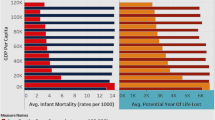Abstract
Budgetary capacity that would allow for the public funding of the provision of universal access to primary education is lacking in many sub-Saharan economies. National revenues significantly lag behind the overall economic productivity measure of GDP. Analysis of data derived from UNESCO and UNDP for 2004 shows that governments in the region spend far less in US dollars per unit cost on primary education than do developed countries. Increasing the unit cost of education in order to enable a government to guarantee universal primary education would take away resources from other tiers of the education system in many countries in the region. The alternative is to universalise access, despite existing budget allocation constraints, and thereby further compound the problems of poor infrastructure and limited human resource capacity that continue to compromise education quality in sub-Saharan Africa.
Résumé
FINANCEMENT PUBLIC ET DÉFIS BUDGÉTAIRES POUR GARANTIR L’ACCÈS GÉNÉRALISÉ À L’ENSEIGNEMENT PRIMMAIRE EN AFRIQUE SUBSAHARIENNE – La capacité budgétaire qui permettrait le financement public de l’accès généralisé à l’enseignement primaire fait défaut dans un grand nombre d’Économies subsahariennes. Les recettes nationales demeurent nettement inférieures au niveau global de la productivité Économique reflétée par le PIB. Une analyse de données sur l’année 2004 provenant de l’UNESCO et du PNUD démontre que les gouvernements de la région dépensent beaucoup moins en dollars US pour le coût unitaire de l’enseignement primaire que les pays industrialisés. L’augmentation du coût unitaire dans l’enseignement, qui permettrait aux gouvernements de généraliser l’enseignement primaire, ne ferait que soustraire des ressources à d’autres niveaux du système Éducatif dans un grand nombre de pays de la région. L’alternative consiste à généraliser l’accès en dépit des contraintes budgétaires, et ainsi à aggraver encore les problèmes dus à une infrastructure insuffisante et à des capacités limitées en ressources humaines, qui continuent à nuire à la qualité de l’enseignement en Afrique subsaharienne.
Zusammenfassung
STAATLICHE FINANZIERUNG UND HERAUSFORDERUNGEN FÜR DIE HAUSHALTE BEI DER GEWÄHRLEISTUNG EINES UNIVERSELLEN ZUGANGS ZUR GRUNDBILDUNG IN AFRIKA SÜDLICH DER SAHARA – In vielen Ökonomien Afrikas südlich der Sahara fehlt es an ausreichenden Haushaltsmitteln, um den universellen Zugang zur Grundbildung zu finanzieren. Die Staatseinnahmen bleiben erheblich hinter dem BIP als Maßstab für die gesamtwirtschaftliche Produktivität zurück. Von UNESCO und UNDP abgeleitete Datenanalysen aus dem Jahr 2004 zeigen, dass die Regierungen in dieser Region weit weniger US-Dollar für Grundbildung ausgeben als Industriestaaten. Würde man die Bildungsausgaben pro Einheit erhÖhen, damit eine Regierung universelle Grundbildung gewährleisten kann, so würde man damit in vielen Ländern der Region lediglich anderen Stufen des Bildungssystems Ressourcen entziehen. Die Alternative besteht darin, ungeachtet der vorhandenen Einschränkungen bei der Zuweisung von Haushaltsmitteln den Zugang für alle zu ermÖglichen und damit die Probleme der mangelhaften Infrastruktur und der begrenzten Personalkapazitäten, durch die die Bildungsqualität in Afrika südlich der Sahara noch immer beeinträchtigt wird, weiter zu verschlimmern.
Resumen
EL FINANCIAMIENTO PÚBLICO Y LOS RETOS PRESUPUESTARIOS PARA PROVEER ACCESO UNIVERSAL A LA EDUCACIÓN PRIMARIA EN EL ÁFRICA SUBSAHARIANA – La capacidad presupuestaria que pueda permitir el financiamiento público de un acceso universal a la enseñanza primaria es insuficiente en muchas economías subsaharianas. Los ingresos nacionales se sitúan muy por debajo de los indicador generales de productividad económica en PIB. El análisis de los datos obtenidos de la UNESCO y del PNUD en cuanto a 2004 indican que, en dólares estadounidenses de costo por alumno, los gobiernos de la región gastan mucho menos en educación primaria que los países desarrollados. Pero si se aumentaran los costos por alumno, para permitir que un gobierno garantice la educación primaria universal, estos solamente absorberían recursos de otros segmentos del sistema educativo en muchos países de la región. La alternativa sería universalizar el acceso, pese a las limitaciones de asignación presupuestaria y la consiguiente agudización de los problemas de falta de infraestructura y de recursos humanos que siguen perjudicando la calidad de la educación en el África Subsahariana.
Similar content being viewed by others
References
Adedeji, A. (1999) Structural Adjustment Policies in Africa. International Social Science Journal, 51(162), 521–28.
Avenstrup, R., X. Liang and S. Nellemann. 2004. Kenya, Lesotho, Malawi and Uganda: Universal Primary Education and Poverty Reduction. A case study from the conference “Scaling Up Poverty Reduction,” Shanghai, 25–27 May. Washington, DC: International Bank for Reconstruction and Development/World Bank. http://info.worldbank.org/etools/docs/reducingpoverty/case/58/fullcase/East%20Africa%20Edu%20Full%20Case.pdf, accessed 10 July 2008.
Bennell, P. 2002. Hitting the Target: Doubling Primary School Enrollments in Sub-Saharan Africa by 2015. World Development, 30(7), 1179–94.
Birdsall, Nancy, R. Levine, and A. Ibrahim. 2005. Toward Universal Primary Education: Investments, Incentives, and Institutions. UN Millennium Project 2005: Task Force on Education and Gender Equality. London: Earthscan. http://www.mdgender.net/upload/monographs/Task_Force_3_-_Education-complete.pdf, accessed 10 July 2008.
Buston, O. 2002. Every Child in School: A Challenge to Finance and Development Ministers. Oxfam Briefing Paper 20. Washington, DC: Oxfam International. http://www.oxfam.org.uk/what_we_do/issues/education/downloads/bp20_school.pdf, accessed 10 July 2008.
Central Bank of Kenya. 2007. Monthly Economic Review, December 2007. Nairobi: Government Printers. http://www.centralbank.go.ke/downloads/publications/mer/dec07.pdf, accessed 10 July 2008.
Commonwealth Education Fund (CEF) Kenya. 2003. Strategic Plan 2002–2005. London: CEF. www.commonwealtheducationfund.org/downloads/downloads/Latest%20strategic%20plans/sp_kenya.doc, accessed 10 July 2008.
Curtin, T. R. C., and Nelson, E. A. S. (1999) Economic and Health Efficiency of Education Funding Policy. Social Science & Medicine, 48, 1599–1611.
DfID. 2005. From Commitment to Action: Education. London: DfID & HM Treasury. http://www2.dfid.gov.uk/pubs/files/g8-outcomes-education.pdf, accessed 10 July 2008.
Fredriksen, B. 2005. Keeping the Promise. Finance and Development 42(2). http://www.imf.org/external/pubs/ft/fandd/2005/06/fredriks.htm, accessed 10 July 2008.
Government of Finland. 2005. Finland’s Trade Policy Programme: Government Resolution 8 September 2005. Helsinki: Ministry of Foreign Affairs of Finland. http://formin.finland.fi/public/download.aspx?ID=15119&GUID={EDBBCC79-8899-4B15-9A95-FA7830E7EF46}, accessed 10 July 2008.
Government of Kenya. 2007. Education Sector Report 2007. Nairobi: Ministry of Finance. http://www.treasury.go.ke/sector_reports/EDUCATION_SECTOR_REPORT_2007%20_DRAFT_.pdf, accessed 10 July 2008.
Hallak, J., and M. Poisson. 2007. Corrupt Schools, Corrupt Universities: What Can Be Done? Paris: International Institute for Educational Planning (IIEP). http://unpan1.un.org/intradoc/groups/public/documents/UNESCO/UNPAN025403.pdf, accessed 10 July 2008.
Kelly, G. P. (1987) Comparative Education and the Problem of Change: An Agenda for the 980s. Presidential Address. Comparative Education Review, 31(4), 477–89.
Krieger, M. (1988) African Policy Linking Education and National Development: Standard Criticisms and a New Departure. International Review of Education, 34(3), 293–311.
Landau, D. (1986) Government and Economic Growth in Less Developed Countries: An Empirical Study for 1960–1980. Economic Development and Cultural Change, 35(1), 35–75.
Lee, K. H. (1988) Universal Primary Education: An African Dilemma. World Development, 16(12), 1481–91.
Ligomeka, B. 2002. Malawi: Free Primary Education Backfires. News from Africa, May 2002. http://www.newsfromafrica.org/newsfromafrica/articles/art_902.html, accessed 10 July 2008.
Marshall, M. G., and Goldstone, J. (2007) Global Report on Conflict, Governance and State Fragility 2007: Gauging System Performance and Fragility in the Globalization Era. Foreign Policy Bulletin, 17, 3–21.
Ministry of Education and Culture, Tanzania (MEC). 2000. Education in a Global Era: Challenges to Equity, Opportunity for Diversity. Paper presented at the Fourteenth Conference of Commonwealth Education Ministers (14CCEM) Halifax, Nova Scotia, Canada, 27–30 November. Dar es Salaam: Ministry of Education and Culture. http://www.moe.go.tz/pdf/EDUCATION%20FOR%20ALL.pdf, accessed 10 July 2008.
Mukudi, E. (2004a) The Effects of User-Fee Policy on Attendance Rates Among Kenyan Elementary Schoolchildren. International Review of Education, 50(5–6), 447–61.
Mukudi, E. (2004b) Education for All: A Framework for Addressing the Persisting Illusion for the Kenyan Context. International Journal of Educational Development, 24, 231–40.
Nolen, S. 2006. Botswana Bucks the Trend Toward Free Schooling: Uproar Greets Government’s Decision to Charge Tuition. The Globe and Mail 27, April 2006. http://www.ungei.org/SFAIdocs/SFAI_press_clipsMay12.pdf, accessed 10 July 2008.
Novicki, M. A. 1998. Boosting Basic Education in Africa. Africa Recovery Online 11(4). http://www.un.org/ecosocdev/geninfo/afrec/vol11no4/educat.htm, accessed 10 July 2008.
Ogbu, O. M., and Gallagher, M. (1991) On Public Expenditure and Delivery of Education in Sub-Saharan Africa. Comparative Education Review, 35(2), 295- 318.
Oxfam G. B., and ANCEFA. 2004. UPE – Myth or Reality: A Review of Experiences, Challenges and Lessons from East Africa. Report prepared by Alex A. Alubisia. London: Oxfam GB and ANCEFA. http://www.ungei.org/SFAIdocs/resources/UPE_Myth_or_Reality_East_Africa_2005.pdf, accessed 10 July 2008.
Penny, A., Ward, M., Read, T., and Bines, H. (2008) Education Sector Reform: The Ugandan Experience. International Journal of Educational Development, 28(3), 268–83.
Porter, A. T. (1969) African Universities: Our Needs and Our Priorities. African Studies Bulletin, 12(3), 247–53.
Psacharopoulos, G. (1990) Priorities in the Financing of Education. International Journal of Educational Development, 10(2–3), 157–62.
Republic of South Africa. 2005. Budget Review 2005. Johannesburg: National Treasury. http://www.treasury.gov.za/documents/national%20budget/2005/review/Default.aspx, accessed 10 July 2008.
Republic of South Africa. 2006. South Africa Yearbook 2006/2007: Education. Pretoria: Government Com- munication and Information System (GCIS). http://www.gcis.gov.za/docs/publications/yearbook/2007/chapter8.pdf, accessed 10 July 2008.
Republic of South Africa. 2007. Budget Review 2007. Johannesburg: National Treasury. http://www.treasury.gov.za/documents/national%20budget/2007/review/isbn.pdf, accessed 10 July 2008.
Republic of Uganda. 1999. The Ugandan Experience of Universal Primary Education (UPE). Kampala: Ministry of Education and Sports. http://www.adeanet.org/programs/pstr99/pstr99_uganda.pdf, accessed 10 July 2008.
Riddell, A. 2003. The Introduction of Free Primary Education in Sub-Saharan Africa. Paper commissioned for the EFA Global Monitoring Report 2003/4: The Leap to Equality. 2004/ED/EFA/MRT/PI/62. Paris: UNESCO. http://unesdoc.unesco.org/images/0014/001469/146914e.pdf, accessed 10 July 2008.
Sifuna, D. N. 2005. The Illusion of Universal Free Primary Education in Kenya. Wajibu: A Journal of Social and Religious Concern 20. http://africa.peacelink.org/wajibu/articles/art_6901.html, accessed 10 July 2008.
Sifuna, D. N. 2007. The Challenge of Increasing Access and Improving Quality: An Analysis of Universal Primary Education Intervention in Kenya and Tanzania since the 1970s. International Review of Education, 53, 687–99.
UNDP. 2004. Human Development Report 2004: Cultural Liberty in Today's Diverse World. New York: Hoechstetter Printing Co. http://hdr.undp.org/en/media/hdr04_complete.pdf, accessed 08 January 2010.
UNDP. 2006. Human Development Report 2006: Beyond Scarcity: Power, Poverty and the Global Water Crisis. New York: Palgrave Macmillan. http://hdr.undp.org/en/media/hdr06-complete.pdf, accessed 10 July 2008.
UNECA/UNESCO. 1961. Final Report: Conference of African States on the Development of Education in Africa, Addis Ababa, 15–25 May 1961. Unesco/ED/181. Paris: UNESCO. http://unesdoc.unesco.org/images/0007/000774/077416E.pdf, accessed 10 July 2008.
UNESCO. 1990. World Declaration on Education for All. http://www.unesco.org/education/efa/ed_for_all/background/jomtien_declaration.shtml, accessed 10 July 2008.
UNESCO. 2000. The Dakar Framework for Action: Education for All: Meeting Our Collective Commitments. Paris: UNESCO. http://unesdoc.unesco.org/images/0012/001211/121147e.pdf, accessed 10 July 2008.
UNESCO. 2002. Education in Africa: Ministers Meet to Assess Progress. Press Release No. 2002-95. http://www.unesco.org/bpi/eng/unescopress/2002/02-99e.shtml, accessed 10 July 2008.
UNESCO. 2004. EFA Global Monitoring Report 2005: Education for All: The Quality Imperative. Paris: UNESCO. http://unesdoc.unesco.org/images/0013/001373/137333e.pdf, accessed 10 July 2008.
UNESCO-UIS (2007) UNESCO Institute for Statistics Database. Montreal: UNESCO Data Centre.
UNESCO-UIS. 2008. UNESCO Institute for Statistics 2008 Dataset. Montreal: UNESCO Data Centre
Urwick, J. (2002) Determinants of the Private Costs of Primary and Early Childhood Education: Findings from Plateau State, Nigeria. International Journal of Educational Development, 22(2), 131–44.
Watkins, K. 1999. Oxfam Calls for Basic Education for All Africans. Africa Recovery Online 13(4). http://www.un.org/ecosocdev/geninfo/afrec/vol13no4/dec99.htm, accessed 10 July 2008.
Weiler, H. N. (1978) Education and Development: From the Age of Innocence to the Age of Skepticism. Comparative Education, 14(3), 179–98.
World Bank. 2006. Kenya – Education Sector Support Program: Integrated Safeguards Datasheet. Report No. AC1536. Washington, DC: World Bank. http://www-wds.worldbank.org/external/default/WDSContentServer/WDSP/IB/2006/11/09/000104615_20061110101256/Rendered/PDF/Integrated0Saf1et010Appraisal0Stage.pdf, accessed 10 July 2008.
Author information
Authors and Affiliations
Corresponding author
Rights and permissions
About this article
Cite this article
Omwami, E.M., Keller, E.J. Public Funding and Budgetary Challenges To Providing Universal Access To Primary Education in Sub-Saharan Africa. Int Rev Educ 56, 5–31 (2010). https://doi.org/10.1007/s11159-009-9149-9
Published:
Issue Date:
DOI: https://doi.org/10.1007/s11159-009-9149-9




